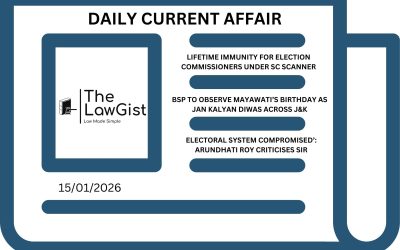
SC clarifies partner’s property rights, ART drug procurement lapses, and GPA’s limitations in ownership claims. Key rulings shaping India’s legal landscape.
DAILY CURRENT AFFAIRS (28 FEBRUARY 2025)
PARTNER’S CONTRIBUTION BECOMES FIRM’S PROPERTY, LEGAL HEIRS CANNOT CLAIM OWNERSHIP: SUPREME COURT
Case Name: Sachin Jaiswal vs. M/s Hotel Alka Raje & Others
According to the Supreme Court, Section 14 of the Partnership Act of 1932 states that a partner’s investment in a partnership firm becomes the firm’s property. Except for their profit share in proportion to the contribution, the partner’s legal heirs are not entitled to ownership of such property upon the partner’s death or retirement.
Legal Provision and Framework:
- Partnership Act, 1932 – Section 14: Property contributed by a partner becomes firm property unless a contrary intention is proven.
- Case Precedents: Addanki Narayanappa vs. Bhaskara Krishnappa (1966) and The Chief Controlling Revenue Authority vs. Chidambaram (1970) affirm that individual property can be converted into firm property without a formal document.
Source: Supreme Court of India
SUPREME COURT SEEKS STATES’ RESPONSE ON ART DRUG SHORTAGES FOR HIV/AIDS PATIENTS
Case Name: Network of People Living with HIV/AIDS & Ors. vs. Union of India & Ors.
Recently, the Supreme Court of India instructed all the stated regarding HIV’s ART Anti- Retroviral Therapy medication. The Court directed states to respond on the concerns related to Stockouts, Procurement, Transparency and Drug Quality of the ART, the Court also asked to file affidavits on 6 key issues highlighted by the petitioner in this regard such as supply delays and regulatory inefficiencies. The Court has scheduled the next hearing of the plea on April 4, 2025.
Legal Provision and Framework:
- Right to Health and Life (Article 21, Constitution of India)
- Case Precedents: Consumer Education and Research Centre v. Union of India (1995) recognized the right to health as fundamental.
- Public Interest Litigation (PIL) Guidelines: Courts intervene in systemic failures affecting public health.
Source: Supreme Court of India
SUPREME COURT RULING ON GENERAL POWER OF ATTORNEY PRINCIPAL’S DEATH
Case Name: M. S. Ananthamurthy & Anr. vs. J. Manjula etc
Supreme Court while hearing the case of dispute over primacy of ownership over a suit property. According to the Apex Court ruling, following the Principal’s death, a GPA ( General Power of Attorney) without an interest in favor of the agent is revocable. Unless accompanied by a registered sale document GPA is void. Ownership can not be transferred by any unregistered sale agreement
Legal Provision and Framework:
- Section 202 (Indian Contract Act, 1872): GPA is irrevocable only if coupled with interest.
- Section 54 (Transfer of Property Act, 1882): Sale of immovable property requires a registered sale deed.
- Section 17(1)(b) (Registration Act, 1908): Mandates registration of documents transferring property interests.
- Case Precedent: Suraj Lamp & Industries Pvt. Ltd. vs. State of Haryana (2012) reaffirmed that GPA does not transfer ownership rights.
Source: Supreme Court of India
Also Read- DAILY CURRENT AFFAIRS (27 FEBRUARY 2025)







